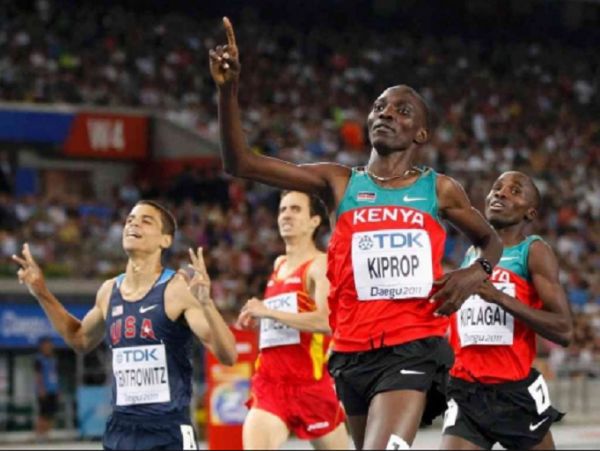Despite The Hurdles, Kenyan Athletics Continues To Make Strides On Doping
30th July 2019
In 2018, three-time world champion and Olympic 1,500 metre winner, Asbel Kiprop, tested positive for EPO and was also banned

- Kenya suffered international embarrassment in 2016 when a string of doping scandals brought the country famed for its distance runners within a whisker of disqualification from the Rio Olympics
- Kenya scraped through to Rio. But while its sporting authorities promised to clean up their act, Kenyan athletes have proved harder to convince
- Between 2004 and August 2018, 138 Kenyan athletes tested positive for performance-enhancing drugs, according to a World Anti-Doping Agency (WADA) report published in September 2018
NAIROBI, Kenya- Kenya
suffered international embarrassment in 2016 when a string of doping scandals
brought the country famed for its distance runners within a whisker of
disqualification from the Rio Olympics.
"It was a time when Kenya faced an enormous challenge
in terms of the very integrity of our sports," said Japhter Rugut, who
heads the Anti-Doping Agency of Kenya (ADAK), established in the wake of the
scandal.
Kenya scraped through to Rio. But while its sporting
authorities promised to clean up their act, Kenyan athletes have proved harder
to convince.
A year after the scare, Jemima Sumgong -- who in Rio won
Kenya's first-ever Olympic gold in the women's marathon -- tested positive for
the banned substance erythropoietin (EPO) and was suspended.
In 2018, three-time world champion and Olympic 1,500 metre
winner, Asbel Kiprop, tested positive for EPO and was also banned.
MUST
READ: New Bandari Signing Chetambe Confident After Bagging May/June Player
Award
Between 2004 and August 2018, 138 Kenyan athletes tested
positive for performance-enhancing drugs, according to a World Anti-Doping
Agency (WADA) report published in September 2018.
The report concluded that nandrolone, an anabolic steroid,
corticosteroids and EPO were the substances most used by local athletes.
However it found there was "no evidence of an
institutionalised system" of doping in Kenya.
Thirty-six Kenyan runners are currently suspended, according
to the Athletics Integrity Unit.
- Building awareness -
Nevertheless, efforts to clean up the sport are beginning to
bear fruit.
Since its inception, the number of anti-doping tests
conducted by ADAK has mushroomed more than 10-fold, from about 100 in 2016 to
1,150 in 2018.
It has created biological passports for about 40 elite
athletes to track their data over time, a development made possible by the
opening of a WADA-approved blood testing laboratory in Nairobi in 2018.
ADAK, under its slogan "Stay Clean, Win Right",
has also launched a nation-wide awareness-raising program aimed at athletes,
coaches and medical staff.
In line with International Association of Athletics
Federation (IAAF) guidelines, Kenyan athletes selected for the 2019 World
Championships starting in Doha in September will be subject to a minimum of
four blood and urine tests.
RECOMMENDED
READ: SportPesa News Transfer Juice: Everton Make Zaha Bid, Arsenal Closing In
On Pepe
"Qualification will be done on time and testing,"
says Jackson Tuwei, president of the Kenyan Athletics Federation.
"We have made this very clear to all our athletes that
those who want to go to worlds, must also qualify by being tested."
But beyond the elite level, tackling doping remains a
monumental challenge.
There are 4,000 top-level athletes registered with the
athletics federation -- four times more than in France for example --
stretching oversight resources.
These athletes see running -- and winning -- as the only way
out of a life of poverty, and go undetected by the checks and controls as Kenya
focuses on its elite athletes.
"There are easily more than 500 top marathon runners...
so it is difficult for the federation, given its limited resources, to monitor
and control each athlete," says specialist journalist Elias Makori.
"Every weekend, there are dozens of Kenyans winning
marathons all over the world."
READ
ALSO: Klopp: Man City Clash Won't Influence Liverpool's EPL Title Hunt
- 'A culture of honesty' -
"In East Africa, unlike anywhere else in the world,
hundreds and hundreds of professional athletes make a very good living from
road running," says Brett Clothier, director of the Athletics Integrity
Unit (AIU), a watchdog set up to police anti-doping in athletics.
"Many of these athletes (...) are never tested out of
competition.
"Such athletes have the motivation, opportunity and
financial means to boost themselves, and therefore there is a high demand for
doping products."
For Brother Colm O'Connell, legendary coach of two-time
Olympic 800m champion David Rudisha, the education of athletes is at the heart
of combating the scourge.
"I also think we must instil in our young people, as
they grow up through the ranks, becoming athletes, we must instil a culture of
honesty, fair-play, that you can win without, you can win clean," he said.
Other significant hurdles remain.
No one is tracing doping substances stocked by pharmacies
and hospitals. The regulation of athletics agents is lax. Allegations of
corruption, too, have marred efforts to clean up the sport.
Even identifying athletes can sometimes prove problematic,
with runners registered under different names from one document to the next.
Political support is also not assured. Kenya's
parliament this year cut funding for ADAK by nearly 15 percent, trimming its
budget to around $2.5 million (2.2 million euros).
With the Tokyo Olympics looming less than a year away, Kenya
is confident it will avoid a repeat of the Rio Games controversy, even if more
work needs to be done.
"For now, there are signs that our joint efforts are
working and that we are on the right track," says Clothier.
"The main thing is that the struggle, and close
collaboration, with AIU continues."
